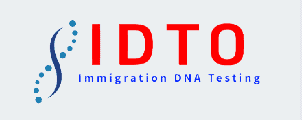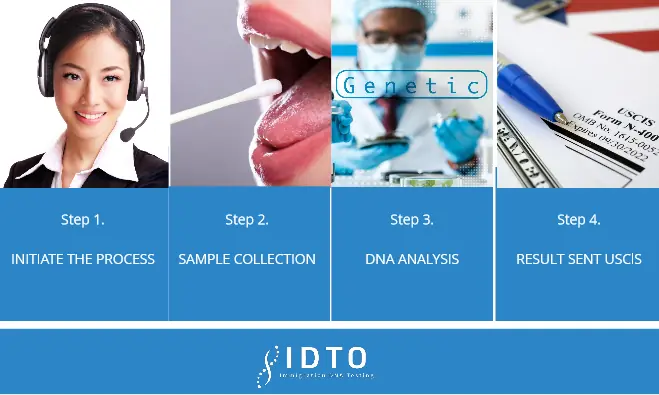What is an Immigration DNA Test?
An immigration DNA test is a genetic testing option that establishes biological relationships between individuals when applying for visas or Consular Reports of Birth Abroad (CRBAs). This test serves as secondary evidence when primary documentation is not enough to prove the claimed relationship.
When should a DNA Test for immigration be performed?
Immigration DNA testing should be performed when:
- An immigration agency, such as United States Citizenship and Immigration Services (USCIS) or a U.S. Embassy, issues a request for evidence. Visa applicants are provided with the option to conduct a DNA relationship test to submit as evidence.
Important Note: Performing a genetic test prior to receiving an office action is not recommended.
All biological relationship tests are performed by our partner AABB-accredited lab. This accreditation ensures that your DNA results will be recognized by all immigration agencies worldwide.
Relationship Testing Options
Paternity Testing: Determines the biological father of a child.
Maternity Testing: Determines the biological mother of a child.
Sibling DNA Testing: Determines if two individuals share a biological parent(s).
Grandparent Testing: Determines if a grandparent and grandchild are biologically related.
Avuncular Testing: Determines if an uncle or aunt with a niece or nephew are biologically related
Immigration DNA Testing Process:
The specific process for immigration DNA testing depends on whether both parties reside in the United States or if one party lives abroad. Here’s a breakdown:
Domestic DNA Testing Procedures (Both Parties in the U.S.):
- Initiate the process: Contact us at 877-680-5800 for immigration DNA testing services by our partner AABB-accredited lab.
- Sample collection: Schedule an appointment at a collection facility near you. Both parties will provide buccal swab samples (cheek swabs).
- Testing and analysis: The laboratory analyzes the samples.
- Results: Results are typically available within 3 business days and sent to the requesting USCIS office and both parties involved.
U.S. Embassies/Consulates Procedures (One Party Abroad):
- Initiate the process: Similar to domestic testing, contact our office at 877-680-5800 for case initiation and appointment coordination.
- Petitioner’s sample collection: You (the petitioner in the U.S.) will provide a buccal swab sample at a designated collection facility.
- Beneficiary’s sample collection: The U.S. embassy or consulate where the beneficiary resides will supervise the beneficiary’s buccal swab sample collection.
- Sample shipment: The laboratory will arrange a shipment of the beneficiary’s sample kit to the embassy/consulate and then back to the laboratory for DNA analysis.
- Results: Results are typically available within 3 business days after the lab receives all samples. They are sent to the embassy/consulate, U.S. Citizenship and Immigration Services (if applicable), and both parties involved.
Key Differences:
- Beneficiary sample collection: In domestic testing, both parties collect samples at a facility. In international testing, the embassy/consulate supervises the beneficiary’s sample collection.
- Embassy involvement: International testing involves the U.S. embassy/consulate in facilitating and supervising the beneficiary’s sample collection.
Additional Notes:
- All immigration DNA testing must be performed by an AABB-accredited laboratory to ensure accuracy and legal admissibility.
- Costs for immigration DNA testing vary depending on the service provider and type of test required.
- It’s recommended to consult with an immigration attorney to understand if DNA testing is necessary for your specific case and the proper procedures to follow.
Please note: This information is for general guidance only and should not be construed as legal advice. Contact an immigration attorney for specific advice regarding your situation.
Frequently Asked Questions
How long does it take to get my results?
Once the lab receives all samples, results are typically available within 3 business days. For international testing, this time-frame does not include the beneficiary’s sample collection process.
How much does an Immigration DNA Test cost?
Contact us at 877-680-5800 for a free consultation and personalized quote. Costs vary depending on the specific test type and your individual circumstances.
Can I proactively submit my results before USCIS suggest DNA testing?
You cannot proactively submit your DNA test results to USCIS before they suggest DNA testing. USCIS advises against performing a DNA test during the initial filing of your petition or visa application. If you submit DNA results before receiving a Request for Evidence (RFE), they will not be accepted.
Premature submission of DNA test results may extend or provoke your application being denied. We recommend that you consult with a immigration attorney for clarity on how to proceed with the filing process.
How accurate is immigration DNA testing?
Immigration DNA testing performed by AABB-accredited labs like ours adheres to industry-accepted standards of 99.5% accuracy or higher. Our partner lab uses advanced technology and stringent procedures to ensure reliable results.
Do I need to consult with an Immigration Attorney?
We recommend consulting with an immigration attorney to understand the visa application process. Remember, although immigration attorneys offer valuable insight into the process. USCIS and embassies will determine if your family will perform DNA testing.
Why Choose Us
At IDTO DNA Testing Center, we understand the critical role accurate and reliable DNA testing plays in your immigration process. That’s why we partner with an AABB-accredited laboratory, ensuring rigorous adherence to the highest industry standards for quality and accuracy.
Your Privacy is Our Priority: We guarantee complete confidentiality and security of your personal and genetic information. We never share your data with third-party companies without your explicit consent or a court order. DNA samples are stored securely for a limited time and then destroyed responsibly.
Painless and Convenient Sample Collection: Our preferred method is the simple buccal swab, a painless cheek swab that provides high-quality genetic material. This non-invasive approach is especially convenient for international testing compared to blood samples.


